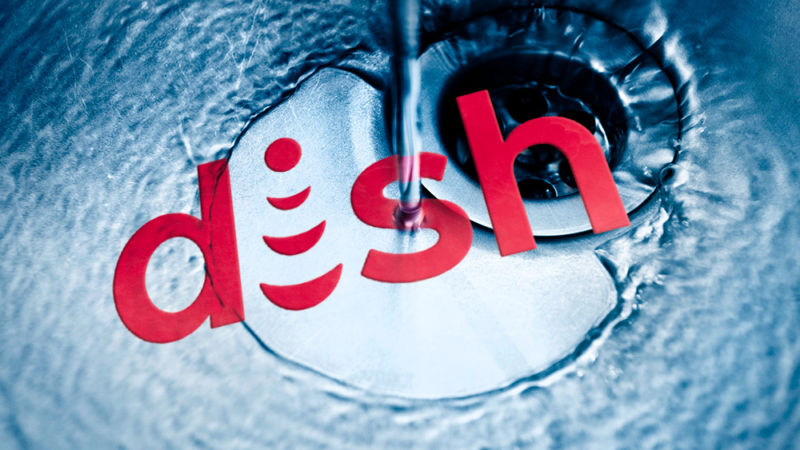
When the Department of Justice approved T-Mobile's purchase of Sprint, the DOJ's antitrust officials insisted that an unusual remedy could replace the competition lost in the merger.
Sprint will no longer exist as a separate entity if the DOJ's plan is finalized, reducing the number of major nationwide mobile carriers from four to three. But the government agency is simultaneously requiring T-Mobile and Sprint to sell some of their assets to Dish Network in what amounts to a government attempt to micromanage the mobile industry.
Dish, the government-selected replacement for Sprint, will create its own mobile service from its existing assets and spare parts the DOJ is requiring T-Mobile and Sprint to sell off. The DOJ acknowledged that T-Mobile buying Sprint "would eliminate head-to-head competition" and threaten the "lower prices and better service" created by that competition. But the department also claimed that the required divestitures will let Dish replace Sprint as a viable fourth carrier.
But will propping up Dish actually replace the lost competition? The answer in the short term is clearly no, because the merger remedies won't result in Dish building a nationwide network overnight. It will take at least a few years, and consumers will be stuck with three major carriers during that time.
Even in the long run, Dish isn't likely to become a full-fledged nationwide competitor because Dish's plan only calls for covering 70 percent of the US population by June 2023. That could leave 100 million Americans without the option of a fourth carrier.
Spectrum and prepaid selloff
The selloff to Dish is contingent on T-Mobile and Sprint completing their merger. Although the federal government has given its blessing, 15 states and the District of Columbia are suing the companies to block the deal.
Pending the lawsuit, Dish is being allowed to buy spectrum licenses, wholesale access to the combined T-Mobile/Sprint network, and Sprint's prepaid business including subsidiaries Boost Mobile and Virgin Mobile. Dish agreed to pay $3.6 billion for spectrum and $1.4 billion for Sprint's prepaid business, which serves 9.3 million customers nationwide.
The wholesale agreement and prepaid divestitures would let Dish become a reseller in the near term, offering service to consumers over the T-Mobile/Sprint network. Under the terms of a settlement with the companies, the US government reserves the right to reject the wholesale agreement if it isn't "commercially reasonable." But as a reseller that doesn't operate its own network, Dish wouldn't be able to offer better service than the combined T-Mobile/Sprint.
Per the DOJ's requirements, Dish would have access to the T-Mobile/Sprint network for seven years. Sprint prepaid customers would be switched to the new T-Mobile/Sprint network and become customers of Dish. Dish will also receive an "option to acquire certain tower, network equipment and retail assets that are being decommissioned as part of the Sprint and T-Mobile integration process," Dish's announcement of the deal said.
The agreement is intended as a stopgap to help Dish gain a customer base while it builds its actual network.
"We plan to aggressively grow the Boost [prepaid] business as well as begin building out the 5G network as soon as possible," Dish Chairman Charlie Ergen said in a July 29 earnings call, according to a Seeking Alpha transcript.
The spectrum licenses included in the deal will help Dish start the multiyear process of building its own network. Specifically, Dish said it is acquiring 14MHz worth of Sprint's nationwide spectrum in the 800MHz band. This will be used along with other low- and mid-band spectrum that Dish already owns.
The future Dish-built network is the key for ensuring that the US has four major competitors. Dish said it has promised the Federal Communications Commission that it "will deploy a facilities-based 5G broadband network capable of serving 70% of the US population by June 2023 and has requested that its spectrum licenses be modified to reflect those commitments." Dish would have to pay fines of up to $2.2 billion if it fails to meet its 5G deployment deadlines.
Dish’s plan won’t match current networks
But 70% of the US is far short of what T-Mobile and Sprint promised the FCC. The merging companies "committed to deploying a 5G network that would cover 97 percent of our nation's population within three years of the closing of the merger and 99 percent of Americans within six years," FCC Chairman Ajit Pai said in May.
Dish is skipping 4G and moving ahead to 5G, which makes sense given that 5G can use all the same frequencies as 4G in addition to new ones in the millimeter-wave range. But Dish's plan of covering 70 percent of the 327 million people in the US isn't impressive compared to the major carriers' current 4G LTE coverage, which is important because carriers admit that 5G won't be much faster than 4G in rural areas where millimeter-wave deployments aren't viable. Outside densely populated areas, Verizon says that 5G speeds will merely be like "good 4G."
While 5G's highest speeds will be provided in dense urban areas via millimeter-wave signals, Dish's spectrum is concentrated in the low- and mid-range bands. This suggests that Dish's 5G won't be much faster than today's 4G networks. The FCC's recent auctions for 24GHz and 28GHz spectrum were dominated by AT&T, T-Mobile, and Verizon.
T-Mobile says its 4G LTE service covers 99 percent of Americans, while AT&T and Verizon report similar numbers. If Dish is only at 70 percent in four years, about 100 million Americans would still only have access to three major carriers.
Sprint's network lags behind the other major carriers and Sprint claims it cannot be a major competitor unless it's allowed to merge with T-Mobile. Yet Sprint's 4G LTE network already reached 300 million people in 2016, or more than 90 percent of the US population. Dish's planned 70% coverage in 2023 thus isn't even close to Sprint's coverage from three years ago.
reader comments
90